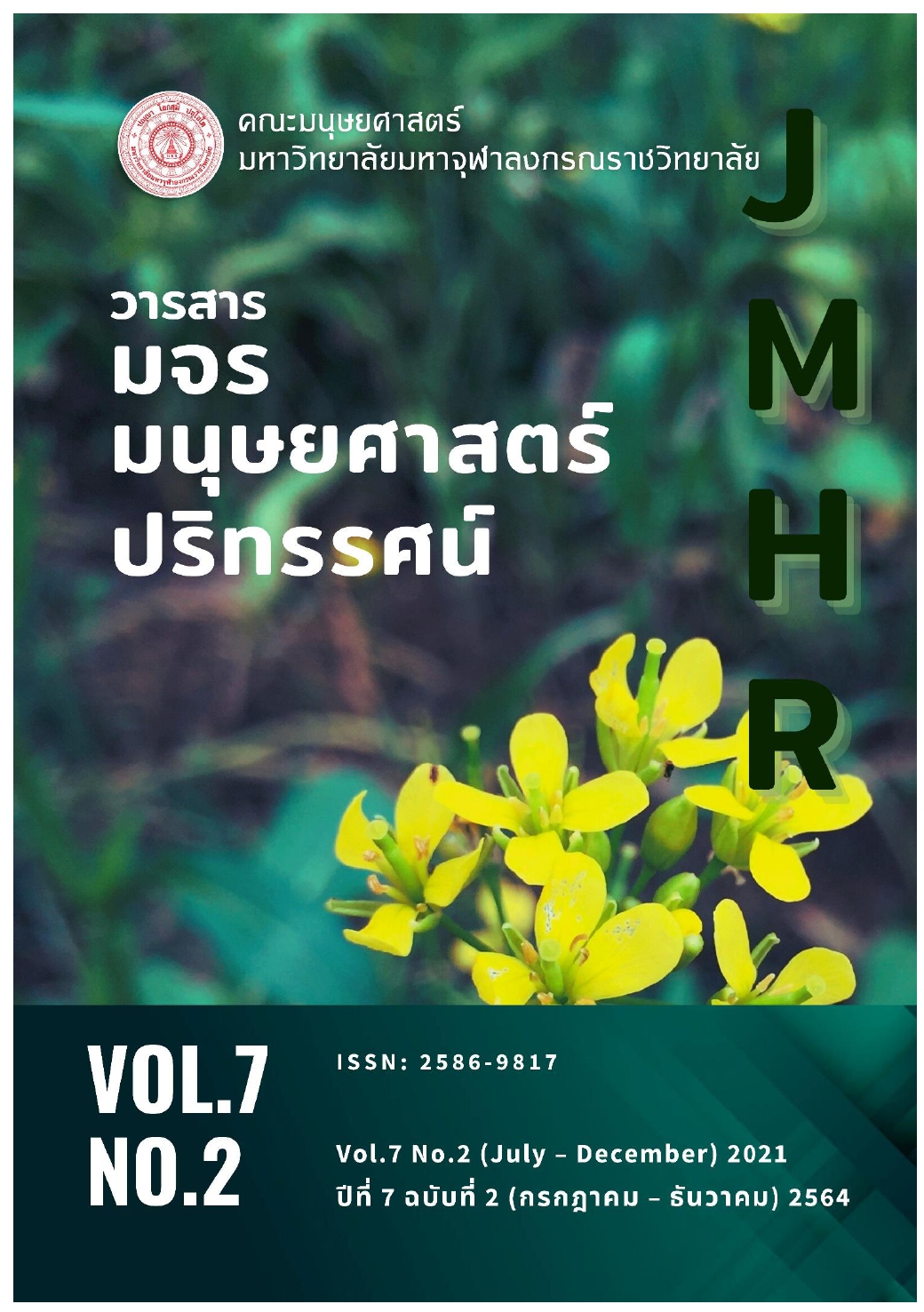ทักษะการใช้ชีวิตในสถานการณ์โควิด 19 ตามหลักพุทธจิตวิทยา
คำสำคัญ:
ทักษะชีวิต, โควิด 19, พุทธจิตวิทยาบทคัดย่อ
บทความนี้มีวัตถุประสงค์ เพื่อนำเสนอแนวทางในการนำหลักพุทธจิตวิทยามาประยุกต์ใช้กับชีวิตเพื่อให้เกิดทักษะในการปรับตัวต่อการดำรงชีวิตในสถานการณ์การระบาดของโรคติดเชื้อไวรัสโคโรนา 2019 (COVID-19) และทั้งทางด้านร่างและจิตใจพร้อมที่จะกล้าเผชิญกับสิ่งท้าทายต่าง ๆ ที่เกิดขึ้นในชีวิตช่วงวิกฤติ เป็นการเตรียมความพร้อมสำหรับการปรับตัวในอนาคต ไม่ว่าจะเป็นด้านสุขภาพกายสุขภาพใจ ด้านความปลอดภัย ด้านสิ่งแวดล้อม ด้านอาชีพการงาน ด้านการตัดสินใจ หรือการเป็นดำรงชีพอยู่การดำเนินงานในชีวิตประจำวันสิ่งเหล่านี้ ล้วนเป็นทักษะการปฏิบัติตัวในสถานกาณ์การระบาดของโรคโควิด 19 เพื่อให้เกิดเปลี่ยนแปลงในวิถีชีวิตใหม่ ที่จะสามารถประคับประคองดูแลตนเองได้อย่างอยู่รอดปลอดภัยมีชีวิตอยู่ในสังคมได้อย่างมีความสุข การนำหลักพุทธจิตวิทยาได้แก่ ปธาน 4 อริยสัจ 4 และสัปปุริสธรรม 7 มาเป็นวัคซีนภูมิคุ้มกันโรคทางกายและโรคทางใจให้อยู่อย่างปกติสุขก่อให้เกิดทักษะการใช้ชีวิตเพื่อให้อยู่รอดในสถานการณ์ปัจจุบันได้อย่างเป็นปกติสุข
เอกสารอ้างอิง
กานต์รวี ดาวเรือง. (2558). ทักษะชีวิตและการวางแผนการดําเนินชีวิตของเด็กและเยาวชน (ชาย) หลังออกจากศูนย์ฝึกและอบรมเด็กและเยาวชน (วิทยานพนธ์สังคมสงเคราะห์ศาสตรมหาบัณฑิต สาขาวิชาการบริหารและนโยบายสวัสดิการสังคม). มหาวิทยาลัยธรรมศาสตร์. กรุงเทพฯ.
ไทยรัฐออนไลน์, มรรค 8 รับมือโควิด-19 อย่างรู้เท่าทัน. สืบค้นวันที่ 27 ตุลาคม 2564, จาก ttps://www.thairath.co.th/ news/local/bangkok/1806099
พระพรหมบัณฑิต (ประยูร ธมฺมจิตฺโต). (2564). โควิทกถา: กรุงเทพฯ: บริษัทอมรินทร์พริ้นติ้งแอนด์พับลิชิง จำกัด (มหาชน)
พระเทพวิสุทธิกวี (พิจิตร ฐิตวณฺโณ). (2543). จิตวิทยาในพระพุทธศาสนา. กรุงเทพฯ: มหามกุฏราชวิทยาลัย.
มหาวิทยาลัยมหาจุฬาลงกรณราชวิทยาลัย. (2539). พระไตรปิฎกฉบับภาษาไทย ฉบับมหาจุฬาลงกรณราชวิทยาลัย. กรุงเทพฯ: โรงพิมพ์มหาจุฬาลงกรณราชวิทยาลัย.
มัณฑรา ธรรมบุศย์. (2553). ทักษะชีวิต. สืบค้นวันที่ 16 ตุลาคม 2564, จาก https://sites.google.com/site/karphathnathaksachiwit1/home
ราชบัณฑิตยสถาน .(2542). พจนานุกรมฉบับราชบัณฑิตยสถาน. กรุงเทพฯ: อักษรเจริญทัศน์.
โรงพยาบาศิครินทร์. (2564). Covid-19 4 สายพันธุ์อันตรายในไทยที่ต้องระวัง. สืบค้นวันที่ 24 ตุลาคม 2564,จาก https://www.sikarin.com/health/covid19-สายพันธุ์อันตรายในไทย
เริงชัย หมื่นชนะ. (2558). ระบบและทฤษฎีพุทธจิตวิทยา. วารสารมหาจุฬาวิชาการ 2(1), 71-74.
สมเด็จพระพุทธโฆษาจารย์ (ป.อ.ปยุตฺโต). (2564). พจนานุกรมพุทธศาสตร์ ฉบับประมวลธรรม (พิมพ์ครั้งที่ 43). กรุงเทพฯ: โรงพิมพ์บริษัทสหธรรมิก.
สมโภชน์ เอี่ยมสุภาษิต. (2556). ทฤษฎีและเทคนิคการปรับพฤติกรรม. กรุงเทพฯ: สำนักพิมพ์จุฬาลงกรณ์มหาวิทยาลัย.
สำนักงานคณะกรรมการการอาชีวศึกษา. การพัฒนาทักษะชีวิตเพื่อสุขภาพและสังคม. สืบค้นวันที่ 24 ตุลาคม 2564. จาก https://sites.google.com/site/karphathnathaksachiwit12/kar-phathna-thaksa-chiwit.
อาร์ม ตั้งนิรันดร,ดร. (2563). นักวิชาการจุฬาฯ เสนอแนวทางรับมือ New Normal ภายหลังวิกฤตโควิด-19. สืบค้น 23 กันยายน 2564. จาก ttps://www.chula.ac.th/news/30432/
Luke Wayne Henderson, Tess Knight & Ben Richardson. (2013). An exploration of the well-being benefits of hedonic and eudaimonic behaviour. The Journal of Positive Psychology. 8(4), 322-336.






